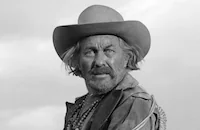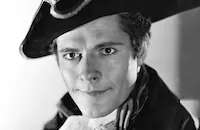True Grit

Brief Synopsis
Cast & Crew
Henry Hathaway
John Wayne
Glen Campbell
Kim Darby
Jeremy Slate
Robert Duvall
Film Details
Technical Specs

Synopsis
In 1880 in Yell County, Arkansas, 14-year-old Mattie Ross vows vengeance on her father's murderer, hired man Tom Chaney, who has fled into Indian Territory. Accordingly, she enlists the aid of one-eyed U. S. Marshal Rooster Cogburn and accepts the help of Texas Ranger La Boeuf, who is intent on the reward awaiting the man to capture Chaney for crimes committed in Texas. Despite mutual distrust, Rooster and La Boeuf unite to dissuade Mattie from accompanying them on their dangerous mission. Undeterred, she joins the manhunt. The trio tracks the assassin across the border to the refuge of outlaw Ned Pepper. During a surprise raid on Pepper's hideout, the lawmen kill four of his fellows and find a gold piece once the property of Mattie's father. Alone, Mattie encounters Chaney. Although she wounds him, Mattie is taken hostage by Pepper's band. Fearing for the girl's life, La Boeuf and Rooster pretend to retreat. Armed to the teeth, the two return unexpectedly to rescue Mattie. As Chaney bludgeons La Boeuf, Mattie shoots the fugitive a second time and falls backwards into a snakepit. After slaying Chaney, Rooster, aided by the dying ranger, pulls Mattie from the pit. Discovering that she has been bitten by a rattlesnake, the marshal, himself wounded, rushes the girl to a physician. Recovering from her injuries, the child proclaims to Rooster her wish to be buried next to him.

Director

Henry Hathaway
Cast

John Wayne
Glen Campbell

Kim Darby
Jeremy Slate

Robert Duvall

Dennis Hopper
Alfred Ryder

Strother Martin

Jeff Corey
Ron Soble
John Fiedler

James Westerfield

John Doucette

Donald Woods

Edith Atwater

Carlos Rivas
Isabel Boniface
H. W. Gim
John Pickard
Elizabeth Harrower
Ken Renard
Jay Ripley
Kenneth Becker
Crew
Lucien Ballard
Frank Beetson Jr.
Elmer Bernstein
Elmer Bernstein
Don Black
John Burton
George Coleman
William W. Gray
Dorothy Jeakins
Dick Johnson
Warren Low
Roy Meadows
Carol Meikle
Ray Moyer
Paul Nathan
John Newton
Marguerite Roberts
Elden Ruberg
Ernie Sawyer
Walter Tyler
Jack Wilson

Photo Collections
Videos
Movie Clip



Trailer
Film Details
Technical Specs

Award Wins
Best Actor
Award Nominations
Best Song
Articles
True Grit
Wallis' original idea was to cast Mia Farrow in the role of Mattie Ross. When first approached, Farrow was eager to take the part and enthusiastically accepted. However, Robert Mitchum, Farrow's co-star in the British production Secret Ceremony (1968), advised her not to work with director Hathaway under any circumstances. Intimidated by the stories of Hathaway's martinet behavior on the set, Farrow insisted that Wallis replace him with Roman Polanski (who would have made a decidedly different True Grit). Instead, Wallis discovered Kim Darby while watching TV one night and decided she was the perfect Mattie Ross.
Hathaway and Wayne had worked together on a number of films before, but his dictatorial style rubbed his younger stars the wrong way. Tired of seeing the director berate Glen Campbell in front of cast and crew, Robert Duvall forced a confrontation one day. The two men had a heated exchange with each other until the air cleared and they managed to come to terms.
Interestingly, arch-conservative Wayne had no qualms about working with a screenplay written by leftist Marguerite Williams, a victim of the Fifties blacklist. Likewise, Wayne's co-star Jeff Corey had been unable to work for many years after the Hollywood Red Scare due to his political past. Despite this, the Duke looked at True Grit as a film that embodied solid American values, and undoubtedly felt himself perfect in the lead role.
True Grit proved to be a box office hit, partly due to The Duke's presence and the compelling but unobtrusive direction of Henry Hathaway. Director of photography Lucien Ballard used his camera to capture magnificent vistas of the movie's Colorado and California locations and the supporting cast - including a young Dennis Hopper - was top notch. The movie, though, is all John Wayne's. If ever there was a role that was made for John Wayne, it was that of Rooster Cogburn. The climactic scene where Cogburn rides across a plain towards the outlaws, guns blazing and reins held in his teeth, immortalizes Wayne as the archetypal Western hero. Wayne himself had the last laugh at the Academy Awards that year. When presented the Oscar® by Barbra Streisand, Wayne, brushing back tears, said "Wow! If I'd known that, I'd have put that patch on thirty-five years earlier."
Producer: Paul Nathan, Hal B. Wallis
Director: Henry Hathaway
Screenplay: Marguerite Roberts
Production Design: Walter Tyler
Cinematography: Lucien Ballard
Costume Design: Dorothy Jeakins
Film Editing: Warren Low
Original Music: Elmer Bernstein
Cast: John Wayne (Reuben J."Rooster" Cogburn), Glen Campbell (LA Boeuf), Kim Darby (Mattie Ross), Jeremy Slate (Emmett Quincy), Robert Duvall (Ned Pepper).
C-128m. Letterboxed. Closed captioning.
by Jerry Renshaw

True Grit
Elmer Bernstein (1922-2004)
Elmer Bernstein, who was not related to Leonard Bernstein, was born on August 4, 1922, in New York City. He displayed a talent in music at a very young age, and was given a scholarship to study piano at Juilliard when he was only 12. He entered New York University in 1939, where he majored in music education. After graduating in 1942, he joined the Army Air Corps, where he remained throughout World War II, mostly working on scores for propaganda films. It was around this time he became interested in film scoring when he went to see William Dieterle's The Devil and Daniel Webster (1941), a film whose score was composed by Bernard Herrmann, a man Bernstein idolized as the ideal film composer.
Bernstein, who originally intended to be a concert pianist and gave several performances in New York after being discharged from military service, decided to relocate to Hollywood in 1950. He did his first score for the football film Saturday's Hero (1950), and then proved his worth with his trenchant, moody music for the Joan Crawford vehicle Sudden Fear (1952). Rumors of his "communist" leanings came to surface at this time, and, feeling the effects of the blacklist, he found himself scoring such cheesy fare as Robot Monster; Cat Women of the Moon (both 1953); and Miss Robin Caruso (1954).
Despite his politics, Otto Preminger hired him to do the music for The Man With the Golden Arm, (1955) in which Frank Sinatra played a heroin-addicted jazz musician. Fittingly, Bernstein used some memorable jazz motifs for the film and his fine scoring put him back on the map. It prompted the attention of Cecil B. De Mille, who had Bernstein replace the ailing Victor Young on The Ten Commandments (1956). His thundering, heavily orchestrated score perfectly suite the bombastic epic, and he promptly earned his first Oscar® nod for music.
After The Ten Commandments (1956), Bernstein continued to distinguish himself in a row of fine films: The Rainmaker (1956), Sweet Smell of Success (1957), Some Came Running (1958), The Magnificent Seven (a most memorable galloping march, 1960); To Kill a Mockingbird (unique in its use of single piano notes and haunting use of a flute, 1962); Hud (1963); earned a deserved Academy Award for the delightful, "flapper" music for the Julie Andrews period comedy Thoroughly Modern Mille (1967), and True Grit (1969).
His career faltered by the '80s though, as he did some routine Bill Murray comedies: Meatballs (1980) and Stripes (1981). But then director John Landis had Bernstein write the sumptuous score for his comedy Trading Places (1983), and Bernstein soon found himself back in the game. He then graced the silver screen for a few more years composing some terrific pieces for such popular commercial hits as My Left Foot (1989), A River Runs Through It (1992) and The Age of Innocence (1993). Far From Heaven, his final feature film score, received an Oscar® nomination for Best Score in 2002. He is survived by his wife, Eve; sons Peter and Gregory; daughters Emilie and Elizabeth; and five grandchildren.
by Michael T. Toole
Elmer Bernstein (1922-2004)
Quotes
You are too old and fat to be jumping fences.- Mattie Ross
Well, come see a fat old man some time!- Reuben J. 'Rooster' Cogburn
By God, girl, that's a Colt Dragoon. Now you're no bigger than a corn nubbin. What are you doing with all that pistol?- Reuben J. 'Rooster' Cogburn
I aim to kill you in one minute, Ned. Or see you hanged in Fort Smith at Judge Parker's convenience. What'll it be?- Reuben J. 'Rooster' Cogburn
I call that bold talk for a one eyed fat man.- Ned Pepper
Fill your hands, you son of a bitch.- Reuben J. 'Rooster' Cogburn
Give me your cup.- Reuben J. 'Rooster' Cogburn
I don't drink coffee, thank you.- Mattie Ross
Well, now, what do you drink?- Reuben J. 'Rooster' Cogburn
I'm partial to cold buttermilk.- Mattie Ross
Well, we ain't got none of that. We ain't got no lemonade either!- Reuben J. 'Rooster' Cogburn
I hope you don't think I'm going to keep you in whiskey?- Mattie Ross
I don't buy that, I confiscate it. And a touch of it wouldn't do you any harm against the night air!- Reuben J. 'Rooster' Cogburn
I would not put a thief in my mouth to steal my brains!- Mattie Ross
Well, it's the real article! Genuine, double-rectified bust head. Aged in the keg.- Reuben J. 'Rooster' Cogburn
Trivia
This film was originally rated M by the MPAA. However it was changed to G just before the film's release.
The only film in which 'Wayne, John' ever won an Oscar.
It was John Wayne, not a stuntman, who actually rode the horse that jumped the four-rail fence at the end of True Grit, much to the dismay of film director Henry Hathaway.
John Wayne had met singer Karen Carpenter on a college show he hosted prior to the shooting of this movie. Wayne was so impressed he wanted Carpenter cast in the role of Mattie Ross.
'John Wayne' reportedly chased costar Dennis Hopper around Paramount with a loaded gun. Hopper had to hide in 'Glen Campbell' 's dressing room until Wayne cooled down.
Notes
Location scenes were filmed in and around Ridgway and Montrose, Colorado, and at Mammoth Lakes in California. Copyright claimants: Hal B. Wallis and Joseph H. Hazen.

Miscellaneous Notes
Selected as one of the New York Times Ten Best Films of 1969.
Released in United States April 16, 1969
Wide Release in United States June 11, 1969
Released in United States Fall October 16, 1969
Released in United States October 1996
Released in USA on video.
Released in United States April 16, 1969 (Los Angeles)
Wide Release in United States June 11, 1969
Released in United States Fall October 16, 1969
Released in United States October 1996 (Shown in New York City (American Museum of the Moving Image) as part of program "Hollywood Independents: Wallis-Hazen Productions" October 12-27, 1996.)














